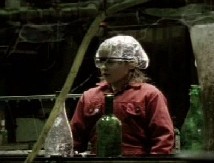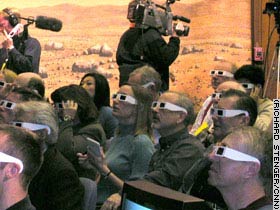Results from yesterday's primary in New Hampshire, and polls of voters' attitudes about candidates, seem to reveal a deepening rift between centrist Democrats and the party members who have supported Howard Dean from the beginning. I think these centrist Democrats woke up about two days before the Iowa caucuses, having ignored the last year of campaigning, and within a couple of days what they saw was (a) Kerry winning and being happy, and (b) Dean screaming. This left them with a positive view of Kerry and an
emotionally negative response to Dean. So when it came time to decide who to vote for, people naturally leaned towards the happy winner instead of the (seemingly) angry loser. This reaction translated into an astonishing poll a couple days after the caucus that showed Kerry beating BUSH by 49% to 47%. If that's how people feel, it's no mystery why Kerry performed so well in New Hampshire: all the Democrats want to beat Bush no matter what, and an unexpectedly large share of Democrats seem intent on beating
Dean no matter what.
Dean's recent declining numbers are attributable to the same kind of problem that messed up Joe Lieberman. In both cases, I think, the root cause was timing. In Lieberman's case, in the earliest days of the campaign (a year ago), he misjudged the politics of the Democrats who would be deciding the "front runner." The people who cared a year ago about who would get the nomination are the angriest and most active members of the Democratic party -- the people who are fed up with Bush and Republican-lite Democrats like Lieberman. Lieberman's mistake was to think that because America wanted a right-centrist Democrat, then the Democrats interested in the pre-Iowa politicking would want the same thing. This was a fatal mistake. What actually happened was that everyone involved early on wanted a left-wing liberal, and they found something close to this in Dean.
Consequently, the hard-core Democrats embraced Dean early on, and they carried him all the way to Iowa. But like I said, two days before the caucus (maybe a little earlier in Iowa itself), all the mainstream Democrats woke up and realized that Dean doesn't really represent their beliefs: Kerry does. Dean's platform is great for the angry, fed-up left-wing of the Democratic party, but it doesn't really resonate with mainstream Americans who, when you ask them, tend to be relatively happy (and certainly not angry) about the way things are going in this country. In this way, Dean has suffered from timing. It's not really his fault, because he shouldn't have to change his platform based on the audience he's addressing, but it's forcing the left to wake up to a cold, hard fact: America, as a whole, does not seem interested in a unabashedly liberal candidate like Dean. The irony of this is that poor old Joe Lieberman, in the end, was right. If he had started off with more liberal ideology, instead of trying to out-Bush Bush, he might have appealed to Democratic faithful early on. Then, as the mainstream started waking up, he could shift a bit to the center, and garner the support of a larger number of voters. Instead, he ended up being painted as a loser, and I think this has had more of an impact on his chances than his actual platform.
So what happens next? Dean is who he is, and that's not changing, so at this point, he'd have a hell of a time trying to come across as a centrist, and he doesn't seem interested in doing that regardless of the impact it would have on his chances. Kerry and Edwards have already staked out the left-center, anyway, and it seems that's where they're going to find the most Democratic voters, and as the campaign wears on, the most undecided voters.
So if Kerry and Edwards are roughly in the same territory, and Kerry was won both Iowa and NH, where does that leave Edwards? The buzz lately has certainly shifted from a Dean/Edwards ticket to a Kerry/Edwards ticket, and a lot of people seem to think this is the solution for everything.
A lot of people, yes, but apparently not Edwards himself: on one of the morning talk shows earlier today (I think it was the Today show), the interviewer asked Edwards, "Will you consider being a vice-presidential candidate." Edwards' response: "No." The interviewer, a little surprised at the directness and unambiguity of his reply, asked again. Again, Edwards said, "No," and added he's in it for the presidency and nothing else. This was very surprising to me, as Edwards is the obvious choice for the VP position. Why would he be so unambiguous? Couldn't he have given a standard "we'll cross that bridge when we come to it" response? Maybe he's thinking that Kerry or Dean have no chance of winning the presidency, so it makes sense for him to just return to the Senate until 2008, when he'd be in a strong position to run again, without the taint of having been part of a losing ticket in 2004? Well, that doesn't work either, because as a reader points out, Edwards' term expires this year and he is not running for re-election. I have no idea if this is his logic, but if people's main concern with him is his lack of experience, wouldn't he do well to be in the public eye as a VP candidate for the whole campaign season? Regardless, I think Edwards made a mistake in being so unambiguous in his response. It's one thing to say it on the Today show, but if that's going to be his standard reply, it could cause problems in the next 2 weeks or so as his presidential aspirations go down the drain.
Regardless of Edwards' stance, it's not over between Kerry and Dean just yet, but Dean certainly has some pretty long odds to overcome. As far as I know, Clinton is the only candidate to recover from losing both Iowa and New Hampshire and ultimately go on to get the nomination. But in 1992, Clinton had upward momentum at this stage in the game, and Dean's momentum seems headed downward. The only way he can recover is if he wins a couple of hotly contested states like Missouri, Arizona, and New Mexico on February 3. If he doesn't, he better start thinking about closing up shop and convincing his faithful to go support Kerry. Kerry is going to need all the help he can get.






 24, the show we
24, the show we 








 It's been a mixed year for homicide: the rate was down in Chicago, LA, and DC, but up in New York. The Windy City just barely defeated us for the title of Murder Capital. The score: Chicago: 599, New York 596. But some might say we had an unfair advantage anyway: Chicago has only about 1/3 of the population of NYC.
It's been a mixed year for homicide: the rate was down in Chicago, LA, and DC, but up in New York. The Windy City just barely defeated us for the title of Murder Capital. The score: Chicago: 599, New York 596. But some might say we had an unfair advantage anyway: Chicago has only about 1/3 of the population of NYC.